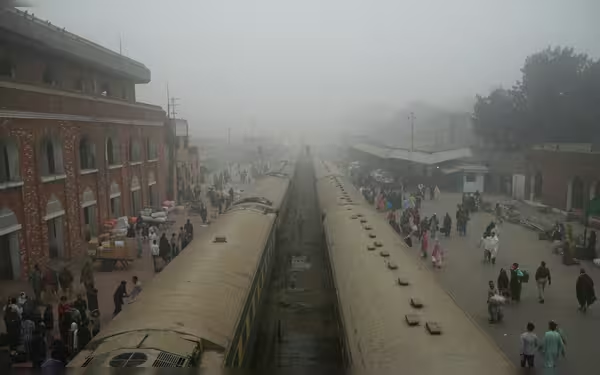Saturday, November 16, 2024 05:43 PM
Punjab Smog Crisis: 2 Million Seek Medical Treatment
- Nearly 2 million seek treatment for respiratory issues.
- Lahore's air quality index reaches hazardous levels.
- WWF calls for urgent action against pollution.
 Image Credits: dawn
Image Credits: dawnPunjab faces a health crisis as smog affects millions, prompting urgent calls for action to combat severe air pollution.
In recent weeks, the province of Punjab has been grappling with an alarming health crisis as smog envelops its cities, leading to a significant rise in respiratory diseases. The Punjab healthcare department has reported that nearly two million individuals sought medical attention for breathing problems and other related ailments over the past month. This surge in health issues is primarily attributed to the record-breaking levels of air pollution, which have reached unprecedented heights.
According to the data, a staggering 1.93 million cases of respiratory diseases were documented in just 30 days, with approximately 69,000 cases reported in a single day. Lahore, the provincial capital, has been particularly hard hit, with 126,230 cases recorded. The air quality index (AQI) in Lahore reached a shocking 1,100, indicating extremely hazardous conditions. Multan has also faced severe pollution, with AQI levels surpassing 2,000 on two occasions, marking a new record for air quality deterioration.
The situation is dire, as the World Wildlife Fund (WWF) has raised concerns about the escalating “smog crisis.” They have urged the government to take immediate action to improve air quality, including addressing pollution sources such as high-emission vehicles and industrial activities. The health implications of this smog are profound, with experts warning that exposure to toxic pollutants can lead to serious health issues, including asthma, heart disease, and even cancer.
In the last 24 hours alone, 4,646 individuals reported severe asthma, while others suffered from ischemic heart disease, strokes, and conjunctivitis. The data reveals that many people are not seeking medical help, opting instead for self-medication or informal treatment options. This trend highlights the need for better awareness and access to healthcare services.
Despite government measures such as closing schools and restricting outdoor activities, the smog continues to persist. Citizens are advised to remain indoors, but experts caution that without air purifiers, harmful pollutants can still infiltrate homes. Unfortunately, the high cost of air purifiers, ranging from Rs25,000 to over Rs150,000, makes them unaffordable for many families.
WWF-Pakistan has called for a nationwide health emergency, emphasizing the urgent need for action to combat pollution. They recommend banning high-emission vehicles and implementing stricter regulations on construction activities during the smog season. Additionally, transitioning to cleaner fuel standards and promoting electric vehicles could significantly reduce emissions and improve air quality in the long run.
As the smog crisis continues to unfold, it is crucial for both the government and citizens to take proactive steps to safeguard public health. Awareness campaigns, stricter regulations, and community engagement can play a vital role in addressing this pressing issue. The health of millions hangs in the balance, and immediate action is necessary to ensure a cleaner, healthier environment for all.













